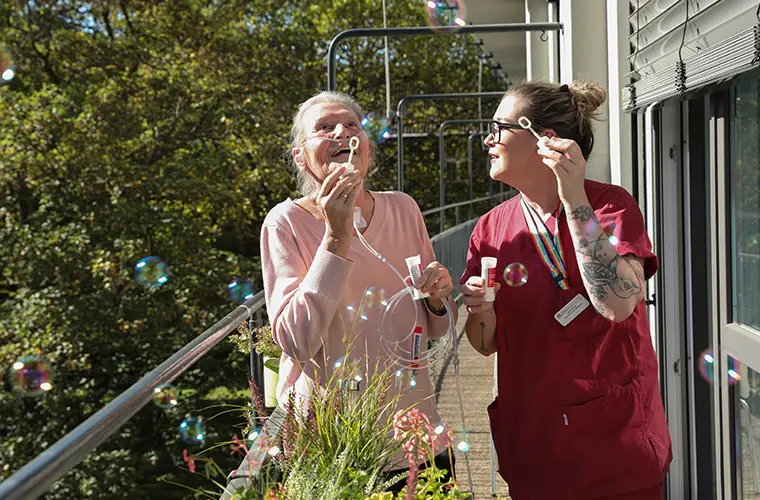Healthcare: Improving access, unburdening systems
Our products are often used to treat people with serious or chronic diseases. Our task therefore is to ensure the safety and quality of our healthcare products and services. We offer a variety of different services in a large network of hospitals, and we supply high-quality drugs and medical devices – always tailored to different healthcare systems, and the needs of patients.
Appropriate solutions for millions of people
Our claim: We aspire to take responsibility for the well-being of millions of patients. Numerous measures are in place to ensure that our products and services are accessible to more and more people.
26
millionpatients were treated in our hospitals in 2023.
23
millionoutpatients.
2
millioninpatients.
25
%of global blood donations are stored in our blood reserves.
1.3
billioninfusion solutions were produced by us in 2023.
The principle of equal opportunities is an important prerequisite for us to improve access to healthcare services worldwide, and to support the development of stable healthcare systems. This means that we want to make treatments and health education available to everybody who needs them – irrespective of age, income, race or ethnicity, and education. To this end, we are committed to a range of different programs and seek to create solutions in collaboration with other companies through associations.
Drugs: Focusing on efficiency and efficacy
Our healthcare products are focusing heavily on generics and biosimilars because they are more cost-effective compared to the original medications. They help to bring down the costs for treatments. This relieves the burden on healthcare systems because they have to pay less money for medicines. Depending on the healthcare system, these products and the associated programs are also able to provide a financial benefit for patients. This is because they then have to make a lower contribution themselves to the therapeutic treatments.
Hospitals: Interdisciplinary and digital care
We are strategically building up regional care clusters and promoting interdisciplinary knowledge sharing and exchange across medical disciplines and between our hospitals. Fresenius combines special care offerings of the individual hospitals, and works to improve quality through conferences on specific topics, e.g. the treatment of cancer or strokes. This type of networking enables us to offer treatments that are particularly expensive and labor-intensive within a cluster of hospitals. This means that they do not have to be provided at every location. For example, Helios deploys multidisciplinary teams of healthcare professionals in order to deliver a holistic therapy approach and facilitate faster and better recovery. One focus is on rapid mobilization of patients following orthopedic surgery – based on the Ortho-Campus model, in which surgery and rehabilitation are brought close together.
We also make use of digital processes and applications in order to provide more straightforward access to healthcare. For example, we are working on achieving short lead times for people awaiting an appointment. In 2023, we were able to give more than three quarters of our patients at Quirónsalud an initial consultation appointment within seven days. Further insights into our progress on digitalization are provided in the section Digital transformation.
Research for progress
We carry out research projects and studies to develop new treatment standards and improve current standards. One example is gender-specific medicine. Gender-specific differences in medicine were neglected until the end of the 20th century. From a biological perspective, differences between women and men include the configuration of chromosomes, sexual characteristics, and hormones. These differences and environmental, cultural and social circumstances can exert an influence on health. Fresenius would like to make a contribution to improving individual consultation, diagnosis, and treatment. Accordingly, Helios published the results of a study on gender- and age-specific differences in disease progression for different COVID-19 variants in 2022.
Cardiac consultation for women
Since 2014, Helios has collaborated with the Leipzig Heart Center to offer a consultation for heart health geared specifically to women. The main thrust of the campaign focuses on treating patients with autoimmune diseases – which affect women much more frequently than men – as well as patients with forms of rheumatism, or pregnancy complications. All of these conditions can lead to heart problems. The health professionals discuss the symptoms with the patients in an atmosphere of calm dialog and trust, and also provide explanations of gender-specific differences. These include the fact that the risk of cardiac arrhythmias is higher in women than in men if they take medication for allergies or antibiotics. Doses of a number of active ingredients for the heart have to be different for women, and side effects may occur more frequently with clotting drugs.
Our commitment to equal opportunities in healthcare
Fresenius is committed to providing access for everyone to therapies and health education. Our commitment to acting responsibly is reflected in our signing of the Zero Health Gaps Pledge of the World Economic Forum in January 2024. It is the world’s first voluntary commitment to promoting equal opportunities in healthcare, and it has now brought together more than 80 companies.




